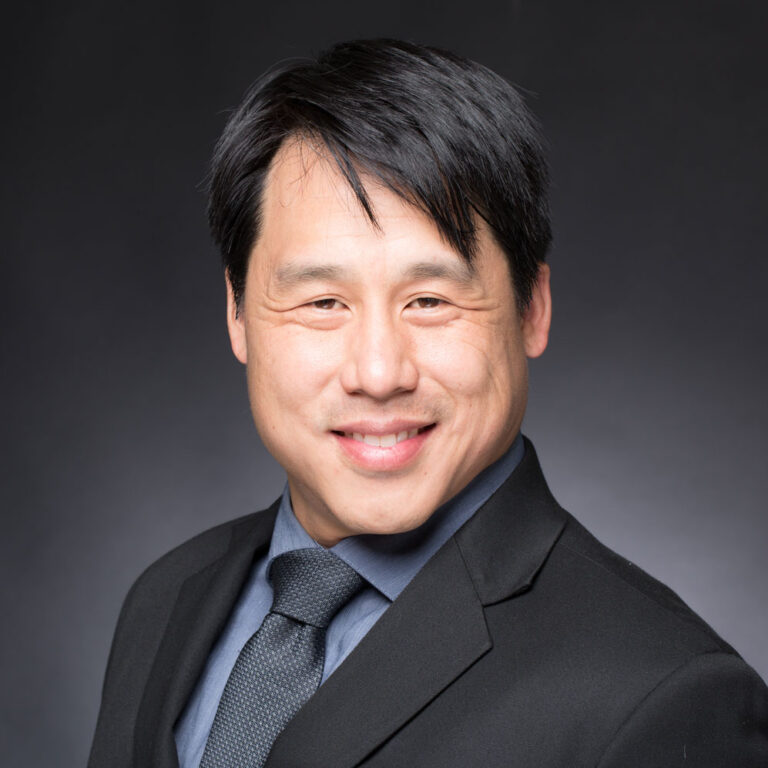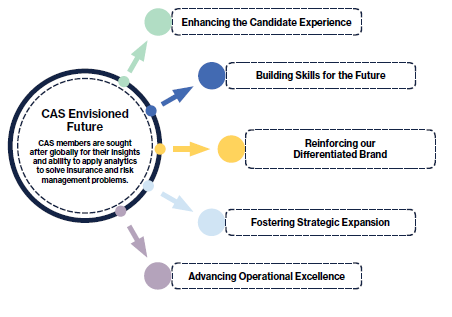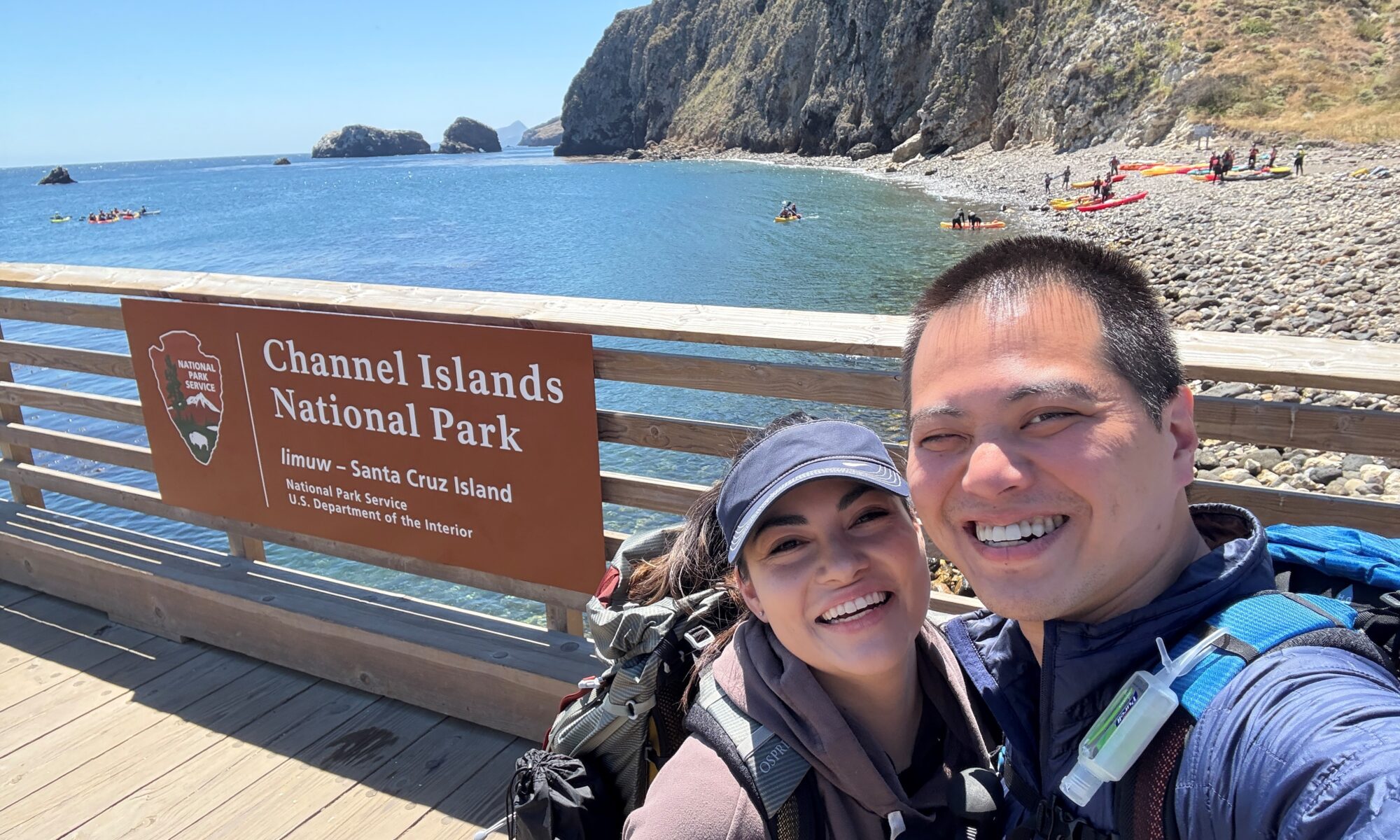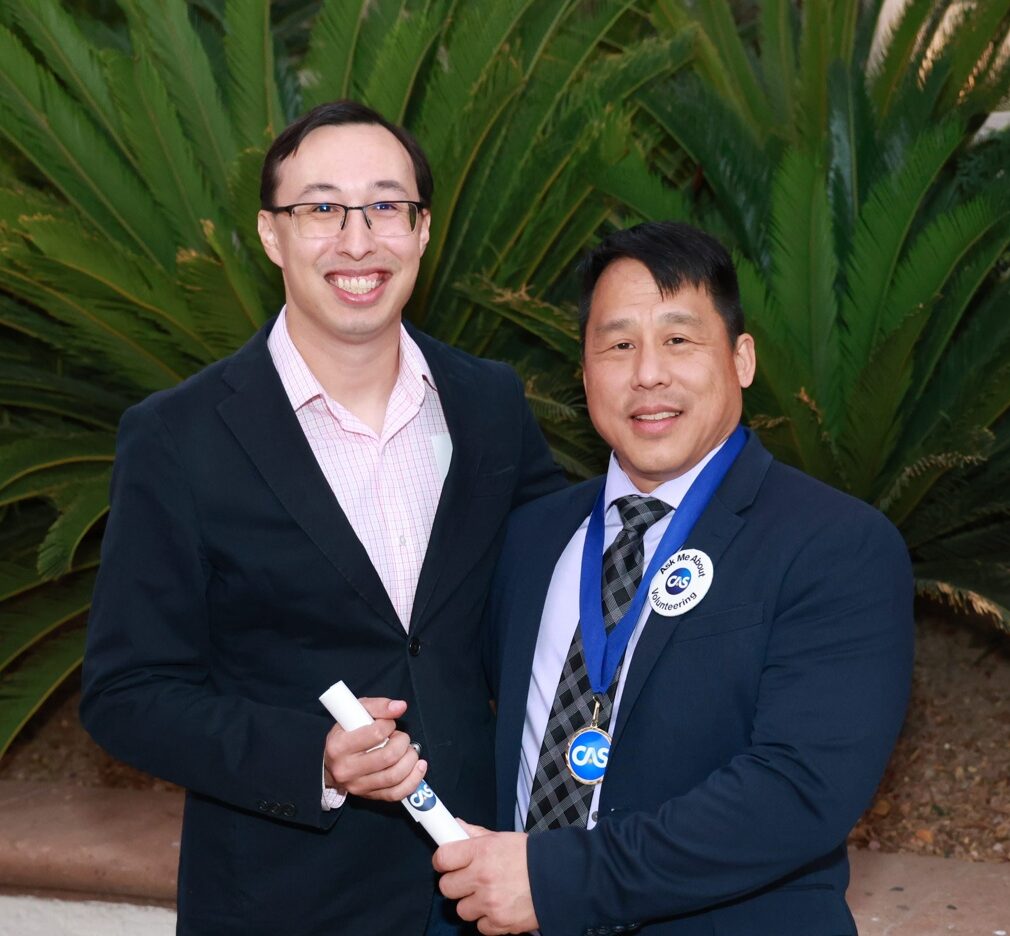
The last year has been quite an eventful year for me and for the CAS. I’d like to provide a short reflection of 2024 on what we sought to accomplish as well as a few thoughts on the upcoming year.
Back in January, I set some priorities for myself to lean in on throughout the year. As a reminder, these priorities included:
- Updating the CAS Strategic Plan.
- Building skills for the future by launching the Property & Casualty Predictive Analytics (PCPA) requirements and planning the next set of admissions requirements through the Actuarial Professional Analysis (APA) survey.
- Implementing the recommendations of the Governance Task Force.
- Strengthening our early pipeline, our engagement with volunteers and members and our relationships with international members and peer actuarial organizations.
CAS Strategic Plan
After a year of hard work under the leadership of Board Member Len Llaguno, Past President Roosevelt Mosley and our CEO Victor Carter-Bey, the Strategic Planning Task Force was able to put together a well thought-out, updated set of pillars addressing many of the challenges and opportunities the CAS will face in the upcoming years. Many thanks to the CAS Executive Council and the Board, as well as all the many volunteers, members and CAS Staff who provided input into the updated plan.
The leadership of the CAS and I strongly believe that the candidate experience is critical to our future, so we added a pillar to our Strategic Plan focusing solely on this. This pillar had already been proposed based on candidates’ feedback to our Admissions staff and volunteers prior to the unfortunate challenges with examinations that we all faced on May 1, 2024. We are committed now both to improving the candidate experience and to hardening our examination process to ensure nothing like this ever happens again.
solely on this. This pillar had already been proposed based on candidates’ feedback to our Admissions staff and volunteers prior to the unfortunate challenges with examinations that we all faced on May 1, 2024. We are committed now both to improving the candidate experience and to hardening our examination process to ensure nothing like this ever happens again.
I firmly believe that the updated plan and pillars will provide the CAS with the right vehicle through which we can focus our efforts.
Building skills for the future
The launch of the future PCPA requirement is well under way, thanks to the heavy lift of volunteers within The CAS Institute, our Admissions staff, our beta testers and graders and the informal set of micro-volunteers who completed the hands-on module and commented throughout. While many actuarial societies around the world have a predictive analytics requirement, ours is the only one focused on applications within P&C insurance.
I’d also like to thank all of those who took the Actuarial Professional Analysis survey, as well as the volunteers who helped construct and edit the survey before its release. The feedback we gathered from this survey will help ensure that we are indeed building skills that account for the future.
Governance
The Governance Committee was able to complete all of its Phase 1 tasks, which include:
- Reviewing all board committees and task forces, examining staffing allocations and constructing charters approved by the board.
- Launching the Human Capital and Compensation Committee, a new committee replacing an outdated operational committee, as well as forming a Membership Linkage Task Force (MLTF) to help the board improve membership engagement.
- Reviewing and revising the position descriptions of vice president, president and president-elect, as well as creating a new position description for the CEO.
The board committees and task forces, which are mostly made up of board members, help the board serve their strategic purpose without needing to delve into every single detail because such work can be delegated to a small group of their peers. In the past year, this structure has helped the CAS Board establish a great rhythm of decision-making and maintain a good strategic focus. This work will help with our new Strategic Plan pillar titled Advancing Operational Excellence. I’m particularly optimistic that the MLTF and the Admissions Governance Council will help the CAS execute other parts of the updated Strategic Plan.
Finally, I’d like to thank Kris DeFrain, the Governance Committee out-going chair, as well as Justin Brenden, Steve Belden and Todd Rogers for their leadership and work. Thanks also to the CAS Executive Council, the CAS Department Chiefs and CEO Victor Carter-Bey for their work refining the position descriptions.
Building our pipeline
In my last column, I mentioned that the CAS Student Central Summer Program had 468 participants from 30 countries. The CAS University Recognition Program, which recently turned one year old, has recognized dozens of universities across the world.
In the past year, I’ve visited a dozen universities, including many international ones, to talk about and share my passion for the CAS and generate interest in our organization among the students. In particular, the Sri Sathya Sai Institute of Higher Learning, a CAS Gold-level recognized university, stands out as a rare gem. Not only do they have dozens of students passing MAS-I and II, but they also graduate students from bachelor’s through Ph.D. in actuarial science, many of whom end up in P&C in India.
This is a pleasant development because life and health often dominate actuarial employment, hence, they also dominate university programs. The CAS also had a presence at the Actuarial Student’s National Association (ASNA), a student-organized convention in Canada.
I’d like to thank the University Engagement Advisory Working Group as well as all our volunteers and university liaisons for continuing to engage future actuaries, giving us the feedback we need and helping the CAS to strengthen our pipeline.
Engaging members, volunteers and employers
For member engagement, the CAS leadership has relied on more forums to gather feedback on large initiatives.
For the Admissions Transformation Plan and, more recently, the APA, we’ve held multiple Town Halls with ample time for questions, as well as conducting roundtables, focus groups and surveys.
The Strategic Plan also underwent a series of vetting processes. We presented an initial version to the CAS Executive Council and Board, held three focus groups with members and two CAS Virtual Town Halls, received a lot of member feedback and refined the plan. Then we presented it again to the CAS Board and at the CAS Leadership Summit to get feedback from the Executive Council, working group chairs and staff. Next, a near final version went to the Board again, followed by a two-week open comment period to all members.
We have made great strides here in terms of transparency. I’m optimistic that this will continue to improve with the MLTF, led by incoming CAS President Dave Cummings.
In addition to member engagement, we are focusing on employer engagement. We are making refinements to our employer engagement strategy, which includes the work of the Employer Advisory Council (EAC), as well as meeting with CAS members who work in regulation, and planning for
expanded international and Canadian employer outreach. I have also enjoyed visits with new CAS members and employee resource groups at four of the larger insurers in the U.S. This work to better engage member employers will continue into the next year and beyond.


We love all our members, but we really cherish our volunteers. At the Spring Meeting, we created a Volunteer Appreciation Lounge — complete with a chocolate fountain, a champagne toast and special treats. In addition to the Volunteer Interest and Participation Survey, the CAS has made it easier than ever to participate with micro-volunteer efforts like University Liaisons, Member Advisory Panel, focus groups, Diversity Impact Group and Student Central Summer Program mentors, judges and presenters. The CAS has also created a handy webpage to learn about volunteering and the different volunteer groups.
CAS volunteers are essential to our success and continued operation, so I make time to meet with and talk to them when traveling. Recently, I met a CAS member based in China who volunteers as an item-writer for one of our upper exams, an area of critical need. If you are considering volunteering, we could definitely use help there.
I’d like to thank the Volunteer Resources Working Group as well as the chairs of all our working groups and committees for their work taking on critical needs and efforts, and for helping us to understand and develop ways to connect with our volunteers.
Collaborating with international organizations
Our international leadership team includes CAS Chief Business Officer Joyce Warner, CAS Director of International Relations Katie Mulembe, CAS Asia Regional Director Bo Lin, and CAS Country Director (China) and Staff Actuary Ran Guo, and VP-International Keith Berman. They have been developing ways for us to collaborate with our international counterparts and create memorable events for our international members. In the past year, I’ve visited and spoken in person and virtually at over a dozen of our peer actuarial organizations throughout the world. These meetings have built relationships with local actuarial presidents and leaders to help plant seeds for future partnerships.
…an ACAS, first-time attendee [at the China Insurance Summit], remarked that if this is how the CAS does events, she would go to all of them!
At this year’s CAS China Insurance Summit in September, we had nearly 200 attendees. One of those attendees, an ACAS, first-time attendee, remarked that if this is how the CAS does events, she would go to all of them! Despite being on the other side of the world, these members felt that they could be part of the CAS community and get great continuing education where they lived.
Also in September, the Joint Property/Casualty Actuarial Seminar was held with the Actuarial Institute of Chinese Taipei for our members and candidates in Taiwan. This event, likewise, spurred appreciation for our efforts to provide continuing education and helped them feel like being a part of the CAS community. For the Associates and Fellows who never were able to fly to the U.S. to “walk” at one of our celebrations of new members at Spring or Annual Meetings, we held a special photo session, complete with a CAS banner, courtesy of Ran Guo.
It is also important to recognize that we need to build strong relationships with U.S.-based organizations like the American Academy of Actuaries, the Conference of Consulting Actuaries, the Society of Actuaries and the National Association of Insurance Commissioners. To this end, I’ve established three-year presidential assignments that divide the U.S., Canada and the rest of the world among the CAS President, President Elect and Past President, so that each organization would have a presidential contact to help build strong connections with the CAS.
Looking to the future
The year wasn’t without challenges. A lot of unexpected things happened that took extra time to address. Despite that, we were able to make the CAS stronger over the past year. As we move to 2025, there are a few reasons to expect the CAS to continue its upward trajectory.
First, we have a strong Strategic Plan, a strong governance structure and updated vice president position descriptions in place to help us stay focused. One of the hardest challenges I faced last year was finding the right place to address incoming valid requests. For every critical challenge, we should have a place and an owner that isn’t difficult to find or determine. In 2025, I believe this will be true.
Second, we have a great leadership team with a seasoned and talented board, a veteran executive council and dedicated CAS staff leadership. Even though William Wilder, our out-going vice president-admissions served us for four years, the reins are passing to Jason Russ, who has been an active member of the Admissions Governance Council. Russ has just wrapped up his three-year term on the board and has been attending Admissions and Syllabus and Examination Committee (SECOM) activities over the last few months. Also, the 2023-2024 CAS Board developed a great board culture and camaraderie with healthy dialogue focused on what matters, using email and other methods to deliberate and get to decisions effectively. Incoming President Dave Cummings is also a long-time CAS leader and CAS veteran, with a strong vision for the Executive Council, Membership Engagement and the future of the CAS.
Finally, reflecting on the trajectory of conversations, I see and hear a lot more expressions of good intent among our volunteers, staff and leadership. All of us are passionate about the CAS, and the best way for all of us to work together is to assume good intent. In the past, misunderstandings would be attributed, based on assumptions, to group dynamics; however, more recently, I’ve seen more and more assumptions and expressions of good intent, which then resolve simple roles and responsibilities questions versus escalating into something more.
I observed this most recently at the CAS Leadership Summit, which was an energizing meeting.
To conclude, we’ve hit many milestones in 2024. Let’s continue this positive momentum. Here’s wishing everyone a great holiday season, a happy new year and a prosperous 2025!













